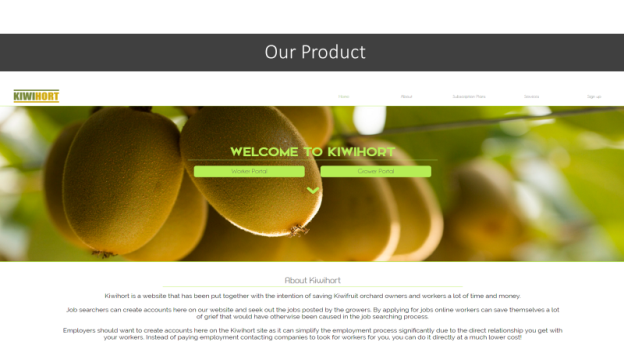Kiwihort Limited Company Analysis
Company Overview
Kiwihort limited is a New Zealand company incorporated in August 2016 to commercialise Kiwihort, a software company aiming to address compliance and regulation issues within the New Zealand horticulture industry. KiwiHort is a utility/software to eliminate tax fraud, labour/farmer exploitation, illegal immigrant problem, and also for managing big labour problems. The original idea emanated from the years of experience of Mr Tajinder Singh within the kiwifruit industry based in the Bay of Plenty region.
History and Current Status
The company has a platform technology for managing seasonal workers involved with kiwifruit industry. Currently a lot of exploitation is happening within the industry. It’s not always the farmer exploiting the contractors and the workers but is also usually the other way around.
KiwiHort was formed in 2015 by the founding members: Tajinder Singh, who is now the company director, and Sangat Deol, who is involved as one of the founding members.
Taj has spent 13 years managing an orcharding contract company and has provided contracted labour to many of the large kiwifruit orchards in Te Puke. Taj has since sold his contracting business and pursued a variety of other commercial enterprises.
San has worked on the kiwifruit orchards since he was a teenager and is now studying software development.
Both San and Taj were increasingly aware of the labour issues facing kiwifruit growers: how can growers ensure workers are legally entitled to work, are fairly paid and are adequately skilled. Was there a way to connect the grower to contractors and individual workers, provide their employment agreements, check visa status and organise wages and PAYE.
Taj had an idea to create a SaaS platform to provide a range of services for purchase by the grower, to be used by all of the worker parties engaged in orcharding relationships. Taj approached San to create a solution and together they sourced a small team to begin development.
In July 2016 Stephen Clinton came on board as the head of software development. Stephen started part time, but as KiwiHort became more demanding Stephen left university to work solely on the project.
KiwiHort is now in the first stage of product development with the first role out due on the 23rd of September.
Objectives
Our strategy is to initially launch KiwiHort for use to the kiwifruit farmers and charging them subscription based fee. Contemporaneously, we will continue to investigate opportunities for using Kiwihort for other market segments such as apples, grapes, avocados etc. We would be looking at a global expansion where we would be pursuing a licensing based strategy for Kiwihort for applications to other industry segments.
We intend to position the company for exit via acquisition by large IT or Agri corporation. Alternatively we could also go the public offering route and have the IPO’s.
Markets
KiwiHort will target parties which are in orcharding partnerships within the New Zealand kiwifruit industry. This market can be segmented into three groups of consumers: kiwifruit growers who regularly source workers to undertake orchard work; contracted supervisors who co-ordinate teams of workers, or alternatively individual orchard workers; and orcharding management companies like Seeka and Apata.
KiwiHort have identified 2556 kiwifruit growers in New Zealand, who have ownership of 12185 hectares of orchards. The grower market-segment spend an average of $23,956 per hectare on orchard worker employment costs annually.
Product description
The core thinking behind the product is providing a viable solution for solving exploitation issues, tax frauds, immigration issues and benefits fraud. The product will be capable of coordinating and connecting different government departments such as IRD, Immigration, Work and Income etc. while as at the same time provide the much needed HR tool for the farmers and the workers. It is capable of classifying the available workforce within different categories based on the grower/ employer preferences. At the same time, it provides a tool for the employees to manage their income as well as avoid any legal hassles in terms of work and health issues. The product development to integrate
Description
Kiwihort can be used to enlist a worthwhile pre-screened quality workforce and in the course of doing so will make the whole process of employment of Kiwifruit workers more transparent, stable, faster and would also provide for a clear communication channel between the employers and employee. This would enable the employers to target the key variables within the employees and would help them fine tune their expenses and also help in delivering better results. A 5% reduction in overall workforce issues will help the farmers increase their revenues by upto 25%.
The dashboard for kiwihort will provide a number of benefits to the user some of which may include the following:
- Transparency (both for employer and employee)
- Avoiding legal issues – assurance of legal compliance
- Tax compliance
- Assurance for migrant and legal workers for fair pay
- Access to pre-screened quality workforce
- Stability
- Faster than paper – Digital Platform
- Clear communication
- Health and Safety – Facilitate drug testing
- Providing information to farmers (Training Tool)
The general dashboard of kiwihort when the employer logs into the system will provide him access to vital information such as
- Options to hire or fire workers working for him
- Number of employees working for him
- Photo Identities of the employees working today
- Search box to classify workers based on different specialities as well as experience and employer ratings.
- Options for available workforce within the specified region.
- Finance management
- Payroll system
- Farm analytics
- Reports
- Weather monitoring
- Calendar
- Documents
Further information about the dashboard can be found in Appendix 1.
Stage of Development
Kiwihort is currently at a prototype stage, and would be ready for its first rollout on 1st October 2016. The system is being currently worked up into a rudimentary prototype, capable of general features such as
- Employee and employer signups and sign-ins
- Visa Validation (done by system administrator)
- Experience Validation
- Contracts
- Casual Employment
- Permanent Employment
- Rating out of 5
Going forward, we need a slick prototype to demonstrate to customers, which requires development and usability testing with target customers.
The technology has not yet been “productized” with an attractive front end or reporting structure.
We propose to involve a few pilot customers in product development, to better understand the customer pain points and ensure we develop a product that is fit for the chosen niche.
Marketing and Sales
KiwiHort will engage each segment of the target market differently. A sales consultant will be employed to initially undertake the responsibility of issuing free trial subscriptions to grower customers in order to generate interest in the service. Kiwihort will be priced under an annual subscription structure and growers will be prompted to renew subscriptions digitally and over the phone by the sales consultant.
Orcharding company customers such as Seek and Apata will be engaged directly through personal efforts by the company Director who has a long standing involvement as a contractor in the industry.
Market Analysis
Kiwihort’s USP is that it can provide users with a clear, transparent stable and faster communication channels between the employers and the employee as well as it can provide access to freely accessible accurate information for different government agencies if and when the need be.
It delivers value in the farm management tool industry as no other competing product provides for an effective digital platform for hiring and managing the labour which can in turn lead to more precise targeting of high value labour and greater returns for the same spend.
It delivers value for the farmer and the contractors as it will be able to provide them with a tension free, easy access to legal workforce who might have the experience as per their requirements. This will prevent exploitation both of workers as well as the farmers and result in greater output as we will be able to provide them with most accurate and up to date information.
In the statistics published by Zespri in their annual report for 2015-16 New Zealand kiwifruit industry employs as many as 353 workers including seasonal workers per hectare per year. KiwiHort has additionally identified 2556 kiwifruit growers in New Zealand, who have ownership of 12185 hectares of producing orchards. The grower market-segment spend an average of $23,956 per hectare on orchard worker employment costs annually.
The Market
There are a number of existing businesses in the space of farm management tools. Producing a very good farm management tool that is capable of even a 10% improvement in farm productivity results is worth significant money, as exemplified by the World Startup Competition, in which the first prize was won by a farm management tool. Furthermore, kiwifruit farmers spend 100s of million dollars annually as wages for workers. Delivering to them the opportunity to improve their results, or to spend less for the same results, is worth millions of dollars every year.
Contractors on the other hand whose core business is to provide workforce to the farmers/growers already spend significant money and resources to acquire this workforce. A platform which would provide them with easy access to database of workforce and their work quality and work status would translate to millions of dollars in saving for them. Kiwihort will offer them ability to spend more efficient, deliver greater results for the same money, or equivalent result for less money. Potential end users will include master contractors within kiwifruit industry and their counterparts in other industries.
Both markets comprise large user base for whom state of the art digital platform would be an extremely important tool, according to various marketing surveys.
Existing technologies and competitor profile:
Market Trends: According to a number of recent surveys, a need for digitizing the New Zealand kiwifruit industry for increasing the per hectare outputs of fruits has been established. Digitizing labour and farm management and upgrading to technology based farm practises, being mentioned as the special need of the hour.
Currently there 133 farm management tools available in the global market. Out of these almost 57% tools have applications only for the dairy farming industry.
Out of the remaining 17% of the tools do not provide any financial management feature while as 30% do not provide any human resource management feature.
Finally known of the researched farm management tools provide feature for labour management which might involve hiring and database management of the workforce.
Out of the 50 farmers, contractors and workers that were interviewed for the market validation of the product more than 90% could instantly connect with the need for such a tool. 26% of the farmers said they might have issues transferring to such a tool but at the same time they also mentioned that they would be more than happy to get on and try the system for 3 months before they would actually buy into such a service. 86% of the contractors thought such a tool could instantly help them better manage and their workers as well as help them in reducing the cost.
Marketing Strategy
Commercial strategy is to launch Kiwihort using a subscription based recurring revenue model selling exclusively to the kiwifruit farmers and contractors.
Contemporaneously, we will continue to investigate opportunities for productizing Kiwihort for other market segments.
Further investigation is required into potential deal structures and targets.
Sales Strategy
We will engage with potential customers via our own director’s personal efforts, coupled with the efforts of very experienced commission only sales agent who have extensive experience in such businesses. Director, Tajinder Singh, is an experienced contractor in the kiwifruit industry.
We will offer “free” or “well below cost” trials for the initial 3 months, to give them satisfaction that Kiwihort provides greater insights and better management for workforce. From there we will engage in a scoping exercise as to what they need and how Kiwihort could be integrated. We will then negotiate the appropriate deal structure, based on our mutual understanding of needs.
Once we have the first rollout, then we will create a sales and marketing plan based off our learnings from our rollout, which we will use to exploit the selected niche in market.
Pricing
The primary beneficiary of our services would be the Kiwifruit farmer or the contractor who would be looking to employ the workforce. These class being the primary user of our services would be charged the maximum amount of $499 per person every month. Along with these the second class of market we would be targeting would be the big farmers or contractors who would basically use our services to monitor their managers and supervisors much more effectively. They would be charged $199 per person per month. Our end user would be the employees who would jump onto our platform for more legally paid work would be able to access the platform free of cost. This would not only provide hem an incentive to use our platform but will also provide us a way of word to mouth promotion.
Sales Forecast
For the first year of sales we expect a steady increase of sales of 50 consumers added every month for the 3-6 months period and then subsequently an addition of 100 employers every month. Also taking into account limited number of monitoring package users and with a market capture of 40% by the end of first year we can have an average monthly revenue of $461,821 every month. With monthly expenditure being in the range of $150,000 we have a gross profit of $311,821 and a yearly profit of 3,741,852 per year before tax.
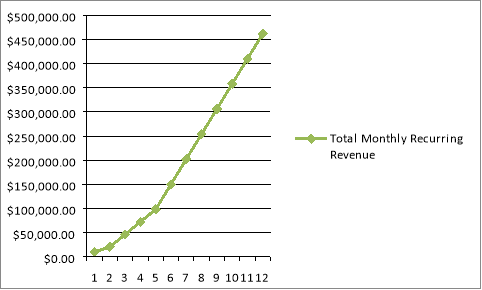
The detailed sales forecasts can be found in Annexure 2.
Internal Strengths
Tajinder Singh’s 13 years of experience has provided an intimate perspective of the Kiwifruit industry’s orcharding employment needs and issues. Tajinder has managed a team of workers as a contracted supervisor to some of the industry’s largest orchards. During this time Tajinder has experienced, first hand, the exploitation of workers and the disastrous impact that under qualified workmanship can have on the profit of kiwifruit crops.
The company is comprised of a unique blend of people from various fields having varied level of experience which help in terms of providing insights from various industries perspectives.
Kiwihort is the only HR management tool to exist in the Kiwifruit industry. Digitalisation of other sectors within the horticulture and agriculture industries is prevalent; however, there are no tools to manage employees, compliance issues or payment of workers.
Internal Weaknesses
The development currently comprises of fresh college graduates with limited to no experience of working in a professional capacity.
Currently most of the company’s work is being carried out from home office which is located in the garage of the company’s director.
As is the case with number of startups currently we promote an open work culture which at times is pretty informal.
ExternalOpportunities
KiwiHort has the potential to move into other sectors within the horticultural industry. Industries for expansion include the apple industry, which employs an average of 16,500 workers annually and has projected industry revenues to reach the 20 billion dollar mark by 2020. The region of Hawke’s Bay, where the majority of the New Zealand apple orchards are, comprises 35% of its labour force with migrant workers. This provides an ideal market for KiwiHort’s services.
The New Zealand grape industry employs 10,900 workers each year across the country. The industry has projected a growth of vineyard plantings to 37,542 hectares by 2018. This expansion will further the need for both seasonal and long term vineyard workers and provides Kiwihort with the opportunity to successfully expand into the grape industry.
Tajinder’s time as a contractor has resulted in many personal industry connections and relationships. These alliances provide access to some of the growers with large orchards and staffing requirements.
Zespri Kiwifruit is a grower owned marketing company with considerable market influence. A partnership, accreditation, or public acknowledgement of Kiwihort’s usefulness and credibility, would provide a valuable marketing and public relations message.
The NZGI works to enhance the commercial interests of growers. A partnership with them would act as a marketing tool of Kiwihort and give direct access to the primary consumer group.
There is an unemployment rate of 5.1% (as at July 2016) in New Zealand. This percentage quantifies 144,000 Kiwis actively seeking employment. Work and Income New Zealand work to assist job seekers to find employment. A partnership with WINZ would ensure suitable unemployed workers would be provided a profile with Kiwihort and access to the Kiwihort job market.
The processing of employee information provides an opportunity to incorporate bank processing and paye facilities into the platform.
Threats
There are a variety of farm based SaaS management tools available in the New Zealand market and a total of 35 reputable comparable services in the global market.
The primary New Zealand competitors are: Agri 360, Cloud Farm, Figure Ltd, Agrivi. All of the competing products are retailed at under a third of the cost of KiwiHort.
External market research has been minimal. It is possible that external threats are present and the organisation is unaware of these threats.
The presence of PSA destroys orchards and profits. This financial loss will reduce the disposable income, and consequently, the willingness of growers to invest in new tools and services, regardless of the benefits.
Initially most operations will be provided using a subcontractor model via Hypernova limited within whom we have a strong relationship via our founder and director Tajinder Singh.
Technical operations and development will be overseen by the lead software developer, Stephen Clinton who is willing and able to act as Chief Technology Officer.
We have an experienced and willing commission only sales agent on standby once a product has been produced to sell into the New Zealand market.
Upon completion of the second round of funding, we will appoint further team members in marketing and sales, and we will look at bringing product development entirely in-house.
Key Personal
- Tajinder Singh – Founder/Director
- Sangat Deol – Head of Operations
- Stephen Clinton – Lead Developer
- Shlok Kant – Business Development
- Rachel Beange – Market and Sales Manager
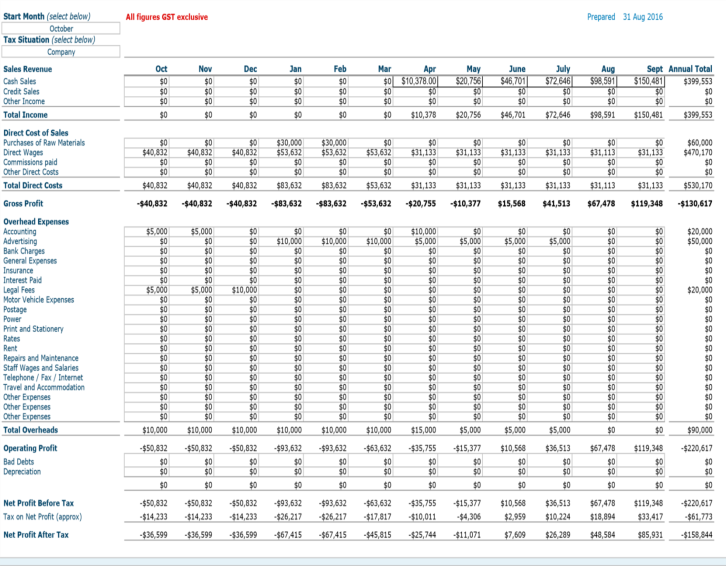
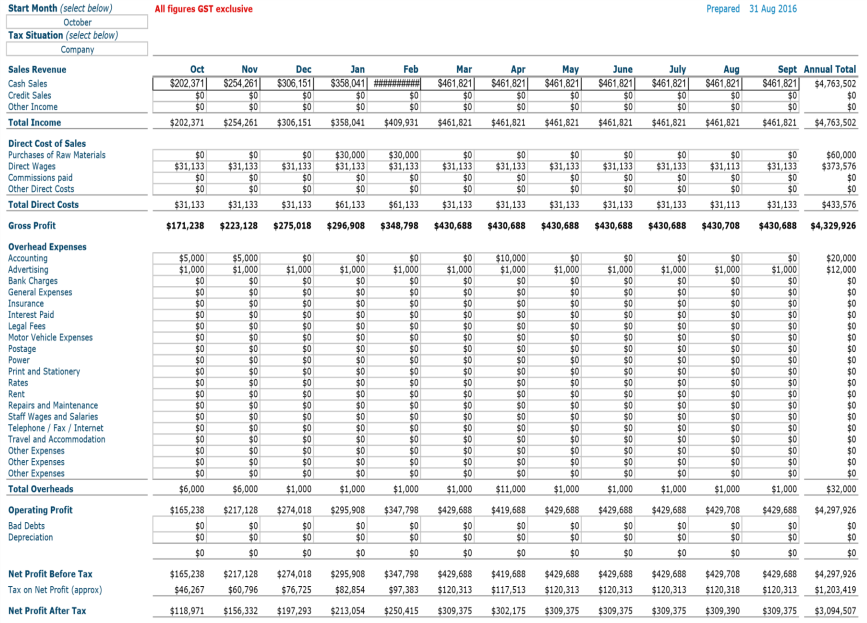
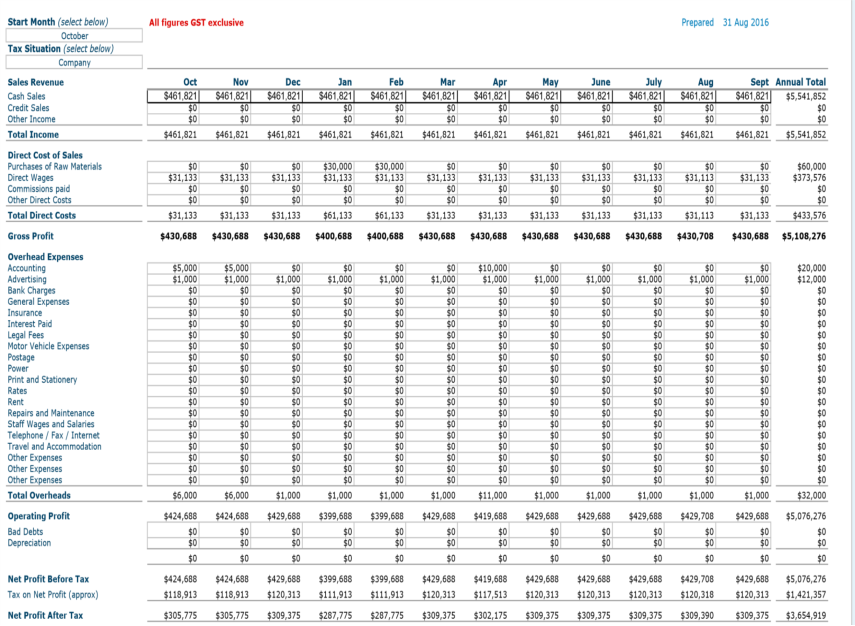
[TEXT]
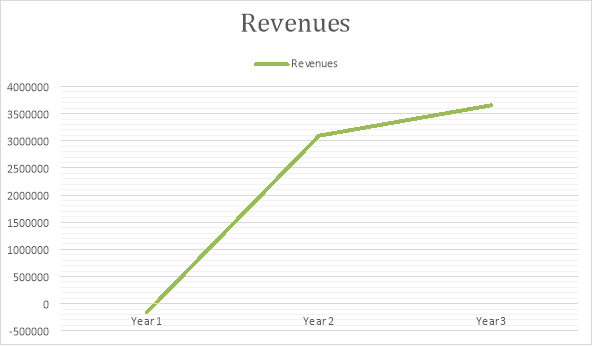
We require initial funding of $500,000 to appoint a various team members and get a first customer contract underway.
Within 6-12 months we will require a further $500,000 to $1,000,000 million for expansion to other market segments both with New Zealand and also on a global level.
We are seeking an initial investment of $500,000 and are willing to give away 30% equity for the same.
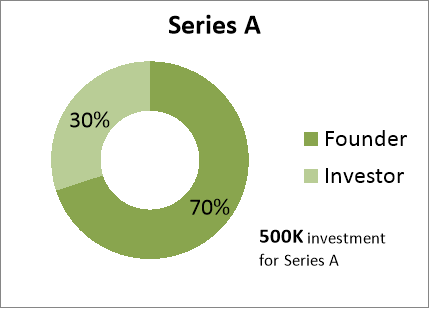
Return

Return on Investment – 5-8 times in 3 years
Break Even – 1.4 years
Rollout One
Testing – 23rd September development complete, 1st october rollout
- Employee and employer signups and sign-ins
- Visa Validation (done by system administrator)
- Experience Validation
- Contracts
- Casual Employment
- Permanent Employment
- Rating out of 5
Tutorials for all features listed above
Rollout Two
Improvements – 1st January rollout complete
- Monitoring of hours and people
- Camera check-ins and/or finger scanner
- Payroll
- XERO invoice system
- Messaging System
- Farmers can manage expenditure and revenue for employees
Tutorials for all features listed above
Rollout Three
all elements of stage one and two should be Robust and without Errors – 1st April rollout complete
- First month – add 20 more growers for testing (total of 30 people)
- Second month – add 20 more growers for testing (total of 50 people)
- Third month – add 50 more growers for testing (total of 100 people)
- Debugging and analysing
Tutorials for all features listed above
Figure 1 – Landing page for kiwihort
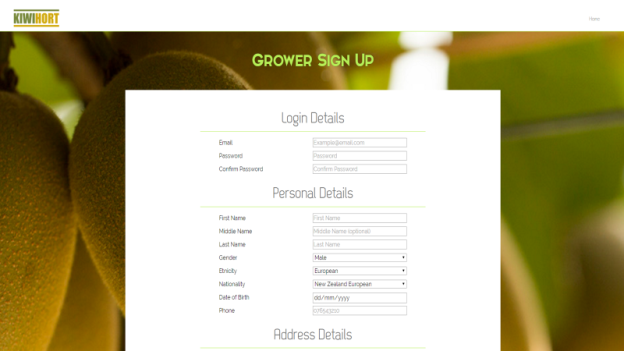
Figure 2 – Grower Sign Up page
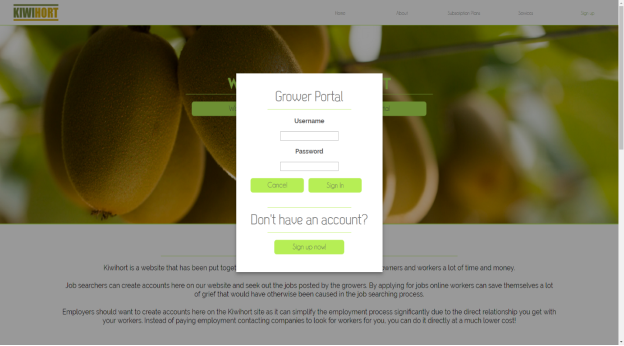
Figure 3 – Grower portal login
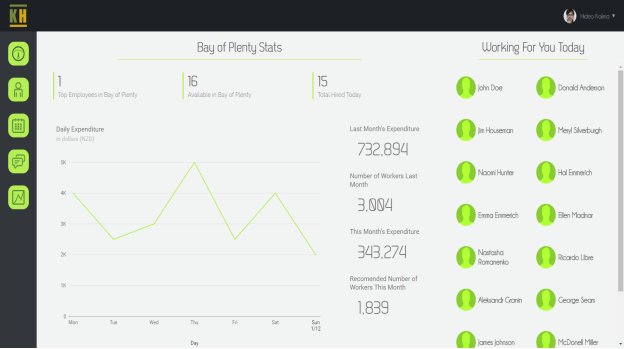
Figure 4 – Grower Dashboard
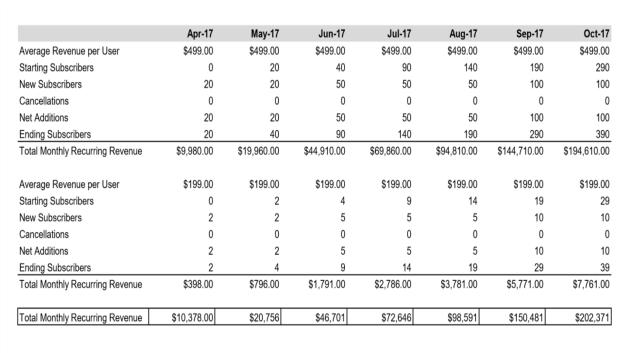
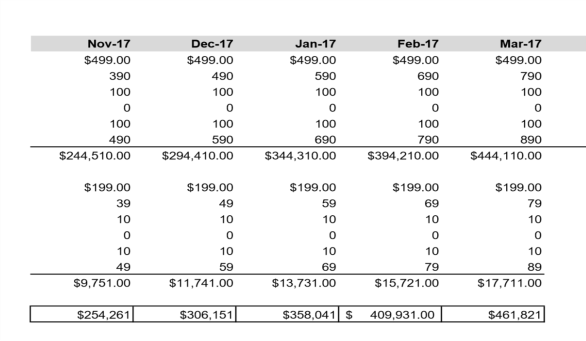
Use of funds
|
Yearly |
6 months |
One Off |
|
Technology Development |
170k |
|
|
1 Business Development |
60k |
30k |
|
2 Sales Consultant |
40k x 2 |
20k (3 Months) |
|
2 Documentation |
20k (3 months) |
|
|
Founder Salary (CEO) |
90k |
45k |
|
Advertisement and Marketing |
50k |
|
|
Misceleneous |
10k |
|
|
Operations and Infrastructure |
||
|
Fingerprint Scanners |
30k |
|
|
Camera |
30k |
|
|
Office Infrastructure |
10K |
|
|
Technical Equipments |
10K |
|
|
Repayble Loans |
||
|
KINDL (Business Consultancy) |
10K |
|
|
Hypernova |
25K |
|
|
Legal Fees |
20K |
|
|
Accountant Fees |
20k |
|
|
Total |
500K |
